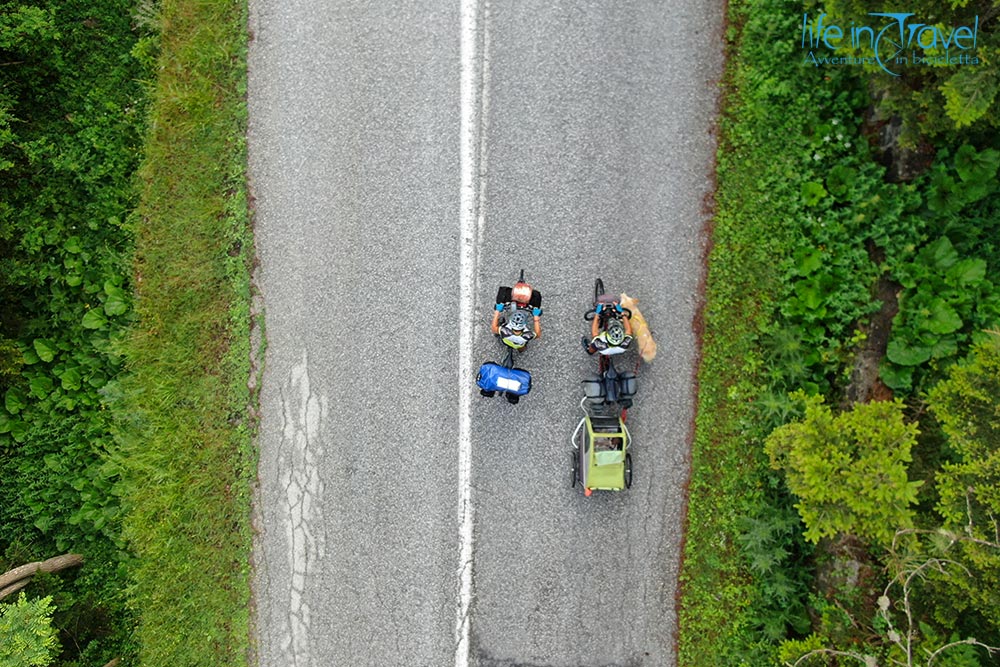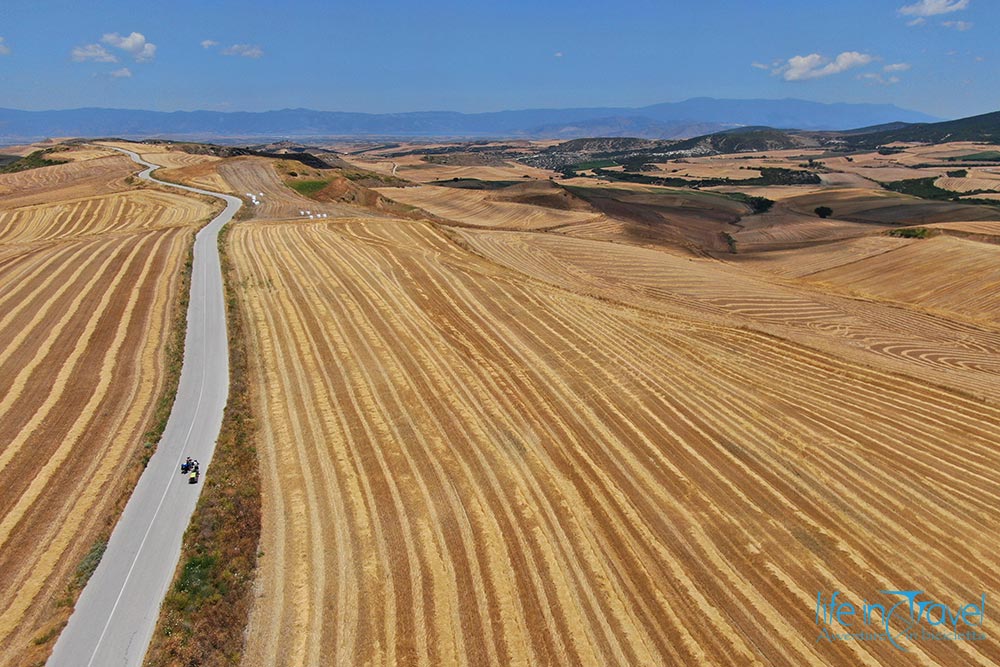Cycling Greece: stunning bicycle routes and tips
In this article
- How can I reach Greece carrying my bicycle?
- Which documents will I need in order to cycle in Greece?
- Is it safe cycling in Greece?
- Which is the best period for cycling Greece?
- How are the roads in Greece?
- Bikepacking and cycling in Greece: the cycle routes
- MTB routes in Greece
- Which maps should I use to cycle in Greece?
- Is it easy to communicate in Greece?
- Which are the most beautiful areas in Greece by bicycle?
- Flora and fauna in Greece
- Is it hard to find water and food in Greece?
- Is it possible and safe to wild camp in Greece?
- How much does it cost biking in Greece?
- How developed is telephone infrastructure technology in Greece?
- What should I bring to cycle in Greece?
- Some suggested itineraries for cycling in Greece
How can I reach Greece carrying my bicycle?

Which documents will I need in order to cycle in Greece?
Is it safe cycling in Greece?
 The majority of these pets are scared by the movement of the bicycles, so the best practice (instead of pedalling faster and being chased by them) is going slower and even get off your bike, using it as a shield between you and the dog. During our Greece bicycle trip, we were with our dog Nala, but this hasn't changed our approach with dogs and everything went smooth. In the rare case you meet an aggressive bunch, you can try screaming in their direction and looking them in the eyes (this method worked in Puglia!) or using your water bottle or (extreme solution) a pepper spray. In the bigger cities don't leave your luggage unattended without a lock, while in smaller villages, where everyone knows each other, you are out of any danger. This said Greece is generally pretty safe.
The majority of these pets are scared by the movement of the bicycles, so the best practice (instead of pedalling faster and being chased by them) is going slower and even get off your bike, using it as a shield between you and the dog. During our Greece bicycle trip, we were with our dog Nala, but this hasn't changed our approach with dogs and everything went smooth. In the rare case you meet an aggressive bunch, you can try screaming in their direction and looking them in the eyes (this method worked in Puglia!) or using your water bottle or (extreme solution) a pepper spray. In the bigger cities don't leave your luggage unattended without a lock, while in smaller villages, where everyone knows each other, you are out of any danger. This said Greece is generally pretty safe.
Which is the best period for cycling Greece?

How are the roads in Greece?
 Its gravel roads and MTB trails are well signalled only near the main touristic destinations, while in the other areas you have to be prepared and informed from home.
Its gravel roads and MTB trails are well signalled only near the main touristic destinations, while in the other areas you have to be prepared and informed from home.Bikepacking and cycling in Greece: the cycle routes
Greece is not a very developed country in terms of cycling. The cycle paths in the area are rare, often only towns, and to stay away from the dangerous busy roads you need to follow secondary, mountain or rural roads. However, it has to be said that cycling in Greece can become simpler by following long-established cycle routes that have already been tested, this is the case of the Eurovelo, the long-distance routes of our continent, which in three cases also cross the Greek nation. The Eurovelos were created to allow safe cycling between the various states of our continent and if on the one hand they are not always marked itineraries (so before departure it is necessary to download the GPS tracks), on the other they almost always follow roads safe enough for cyclists. Travelling by bike in Greece you can follow the Eurovelo 13, at the border with Bulgaria, the Eurovelo 8 which follows the Adriatic coast to Athens and the Eurovelo11 which descends from northern Macedonia to cut off mainland Greece and the coast of Aegean Sea to the capital.
MTB routes in Greece
With a purely mountainous territory and numerous forest roads and routes at high altitude, Greece lends itself very well to being visited by MTB. From Epirus to the Peloponnese you can follow many different off-road tracks that allow you to discover the most authentic and hidden nation. The best times to practice MTB in Greece are spring and autumn, mild seasons that allow you to pedal even at high altitude without running too much the risk of encountering snow to hinder the success of the adventure. Find several MTB routes in Greece here and a brochure dedicated to the Prefecture of Crete of Rethymno with various off-road routes to download for free on the official tourism website in Greece.
Which maps should I use to cycle in Greece?

Is it easy to communicate in Greece?
In Greece the language spoken is Greek, but young people can speak English, so it has become easier and easier to communicate with them. Nonetheless, especially if you are travelling to more rural areas, it's a good practice to learn some phrases. Remember: the Greek language uses the Greek alphabet.
- Kaliméra / Kalispéra (written καλημέρα / καλησπέρα): Good morning / good evening
- Ti kanété? (written Τι κανετε ;): How are you?
- Efkharîsto (written ευχαριστώ ): Thanks
- Parakaló (written Παρακαλω): Please
- Né / óchi (written Ναι / Οχι ): Yes / no
- Eínai to póso (written είναι το πόσο ): How much is it?
- Pó̱s na páte se... ? (written πώς να πάτε σε... ; ): How do I get to...?
On Wikivoyage you can find more phrases and words in Greek.
In Greece, the road signs are usually written in two languages, with the Greek alphabet (more frequently) and the Latin one.
Which are the most beautiful areas in Greece by bicycle?




Flora and fauna in Greece
Greek territory is pretty vast and variegated: despite the presence of the mountains, the influence of the Mediterranean Sea has conditioned the presence of many floral and faunal species. The typical vegetation of coastal Greece is the Mediterranean scrub (and the Garrigue), characterized by the presence of olives, aromatic plants like rosemary, broom, bay tree, oak, holm oak...  The fauna populating Mediterranean areas of Greece counts boars, porcupines, foxes, badgers and the shy Greek tortoise, many insects and reptiles like the horned viper. Then all the roof of the churches and lights poles are full of stork nests. Some areas in Greece, like Lake Kerkini, are affected by the migration of some birds, like the many pelicans that fly there.
The fauna populating Mediterranean areas of Greece counts boars, porcupines, foxes, badgers and the shy Greek tortoise, many insects and reptiles like the horned viper. Then all the roof of the churches and lights poles are full of stork nests. Some areas in Greece, like Lake Kerkini, are affected by the migration of some birds, like the many pelicans that fly there. 
Is it hard to find water and food in Greece?

Is it possible and safe to wild camp in Greece?

How much does it cost biking in Greece?

How developed is telephone infrastructure technology in Greece?

What should I bring to cycle in Greece?

Some suggested itineraries for cycling in Greece
- Continental Greece by bicycle: from Adriatic to Egean sea
- Eurovelo 8 - The Mediterranean route: the Greek part of this long-distance itinerary begins at the border with Albania and ends in Athens
- Eurovelo 11 - The Eastern route: the Greek part of this long-distance itinerary begins at the border with North Macedonia and continues to Athens cutting continental Greece
- Eurovelo 13 - The iron curtain: the Greek part of this long-distance European itinerary runs at the border with Bulgaria until the Black Sea
- One week bike tour in Greece: a Journey across Greece
- Meteora bike tour loop: a tour around the UNESCO site in Greece
Log in with ( Sign Up ? )
or post as a guest

Francesco G
ITA - Ho 33 anni e sono piemontese, anche se da qualche anno vivo e lavoro in Lombardia. Dopo un inizio da totale inesperto in questo campo, mi sono avvicinato al mondo dei cicloviaggi e della bicicletta sempre più. Oggi posso definirmi "cicloviaggiatore", e assieme all'altra mia passione - il videomaking - non mi fermerei mai! Cyclo ergo sum, pedalo quindi sono, per cercare di capire perché andare in bici sia così bello, terapeutico, ricco... E ogni volta che provo a capirlo, non ce la faccio, e sono costretto a ripartire sui pedali!
ENG - I'm from Piedmont and I'm 33 years old, I have been living and working in Lombardy for a few years. After a start without any competence in this field, I then approached the bicycle world more and more. Today I can call myself a bicycle traveller and videomaker who would never ever stop. Cyclo ergo sum, I cycle therefore I am. I ride my bike trying to understand why it is so beautiful, rich, therapeutic. And every time I try, I do not understand it. So I must leave again...
Latest from Francesco G
- Farewell Iohan Gueorguiev, you will always inspire us!
- The Oglio Greenway: cycling adventure from Tonale to Po
- Naturehike Cloud Up 2: my review of this bikepacking tent
- Bikepacking or Bike Touring? This is the question
- Best gravel handlebars and how to choose them
- Roswheel bags: Roswheel Tour Pannier Large review









